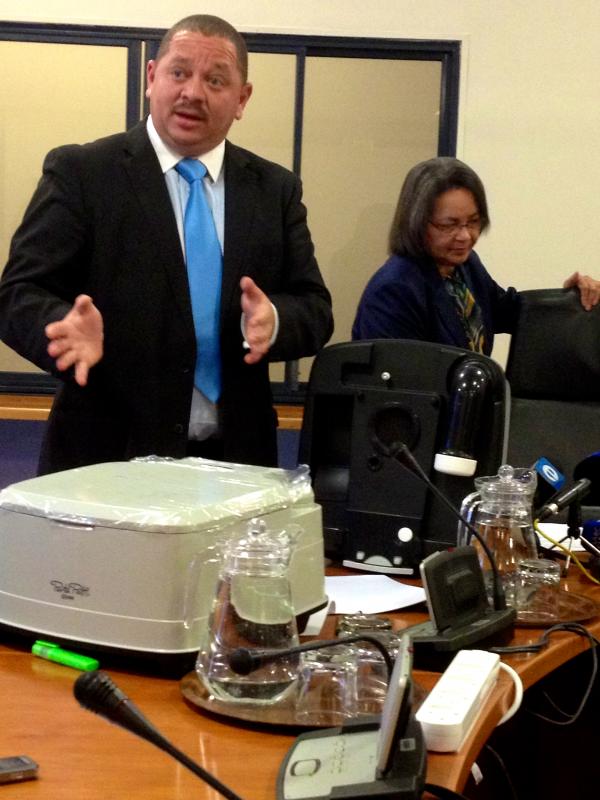

Cllr Ernest Sonnenberg demonstrates the portable flush toilets offered to some as an alternative to the “bucket system”. Mayor de Lille is in the background. Photo by Amelia Earnest.
5 June 2013
Mayor Patricia de Lille held a press conference today to address an unfavourable audit by the Social Justice Coalition (SJC) about the quality of the City’s sanitation services in Khayelitsha.
The audit was published by the SJC in May and claimed that the City was not properly monitoring a contractor responsible for a large number of toilets in Khayelitsha. See Activist group accuses City of failing to monitor toilet contracts.
This press conference came at a time of increasing tension between the mayoral office, the residents of informal settlements, and organisations campaigning for better sanitation. Disgruntled Makhaza residents, some of them linked to the ANC Youth League, dumped faeces outside the Western Cape legislature earlier this week. Yesterday, faeces were thrown at Premier Helen Zille’s vehicle.
De Lille stated that a lack of technical, contextual, and historical understanding was to blame for this most recent censure of the City for substandard sanitary services. “We must not be distracted by those who would spread misinformation,” she said. She interspersed criticisms of the SJC’s report with repeated assurances of the City’s amiable relationship with the organization.
However SJC spokesperson, Axolile Notywala denied there was a strong partnership with Mayor de Lille or her office, “We haven’t met with them since December. We’re still waiting for them to send us a response to our findings and our requests for a meeting.”
De Lille’s statement listed rapid population growth, influx of new residents to informal settlements, vandalism of the toilets, and violence towards the City’s sanitation workers as contributing factors to the current level of sanitation services. She said that the City’s employees had been attacked and stoned and that residents had burned a City truck. She explained that the City’s employees had stopped servicing communities where they had been met with violence. When a journalist asked her how she planned to proceed in areas where the City’s services had stopped, De Lille responded, “What would you do my brother? What would you do?”
The mayor discussed the City’s advancements in sanitation, which, she said, include the highest level of access to sanitation in South Africa at 97% and the doubling of the number of toilets available in informal settlements from the 2005/2006 to the 2010/2011 financial years.
However the SJC doubts that increased quantity alone can solve the problem. “Even if there are 100 toilets in one area that does not mean those toilets are accessible. It does not mean that they are functioning,” Notywala said. The SJC’s audit dealt primarily with the failure of one of the City’s contractors to service existing toilets in four informal settlements.
Mayor de Lille outlined plans for increased communication between community members and government, stating that the City can only fix issues that are brought to its attention. These plans include 67 free call lines, with plans for 20 more by July. Through her new campaign, “Know your Community, Know our Contractor”, de Lille says she has also been addressing communities in person about sanitation issues.
The SJC however said that this is one of the main areas in which the mayor’s office is lacking. “We can’t dictate to people what type of technology they want. The mayor needs to meaningfully engage communities to make sure that people’s wants are heard. The situation with the buckets right now needs immediate attention. People’s health and dignity are at risk.”
The City claims in its statement that there are inaccuracies in the SJC’s audit and details these inaccuracies with six bullet points. GroundUp has analysed these six points.
One bullet point states that the SJC audit was limited to a small sample area. It is not clear why the City considers this an inaccuracy.
Two of the bullet points repeat each other and deal with differences of opinion between the City and the SJC over the demarcated areas and consequently the ratio of toilets to households. The SJC audit explains which areas it examined and that the ratios it found were specific to those areas. The City uses data from 2011 to conclude that the ratio of toilets to households is much better than the ones calculated by the SJC.
The SJC audit claimed that toilets were missing. The City responds that these toilets were relocated to different areas or were being repaired. The City does not appear to dispute the SJC’s finding that the toilets in the areas the organisation audited differed from what was in the City’s contracts.
The SJC audit claimed that many of the toilets were not secured to the ground, leading to some of the toilets falling over. In response the City wrote that it was the at the discretion of the City’s project manager to secure toilets. The City does not actually dispute the SJC’s finding. The City’s statement says, “over securing toilets through the use of sandbags for example can pose a danger, especially at night.”
The SJC claimed that toilets were not being serviced regularly. Here there appears to be a real disagreement over the facts. The SJC measured the regularity at which the toilets were being serviced by examining the toilets directly and interviewing residents. The SJC concluded that the toilets were not being serviced three times per week as described in the City’s contracts. But the City says it has analysed records and invoices and the state of trucks at the Borchard’s Quarry Waste Water Treatment Works. From this it has concluded that servicing is being carried out according to the contracts.
Bringing the conference to a close, the mayor said, “We must do more, and we will do more … but relatively speaking we are the best.”